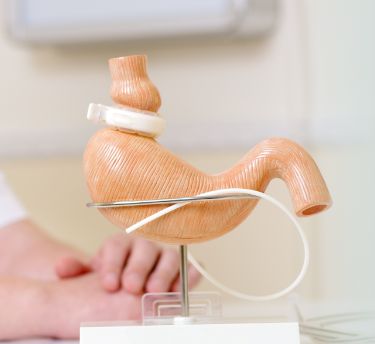Our Doctors
Meet all the doctors from Cleveland Clinic Abu Dhabi.
View Doctors

Bariatric Surgery at Cleveland Clinic Abu Dhabi
Our Bariatric Surgery Program, within the Comprehensive Obesity and Metabolic Center, is a specialized multidisciplinary program for the evaluation of weight problems. Our dedicated team evaluate the causes of obesity and other weight issues and diagnose weight-related metabolic disorders.
What is Bariatric Surgery?
Bariatric surgery, or weight loss surgery as it is sometimes known, is a surgical procedure which helps people with obesity to lose weight. It is often recommended when weight loss methods haven't been successful. It can also help to treat or prevent metabolic diseases that are related to obesity, such as diabetes.
Bariatric and weight loss surgeries alter your digestive system, and help you lose weight by limiting how much you can eat and/or by reducing the absorption of nutrients.
Bariatric surgery is a successful treatment for obesity offering long term results. It also allows healthy lifestyle changes to be more effective, for sustained weight loss and improved overall health.
Who Should Consider Bariatric Surgery?
In general, bariatric surgery and other loss-weight surgeries could be an option for you if:
In some cases, you may qualify for certain types of weight-loss surgery if your BMI is 30 to 34 and you have serious weight-related health problems. Surgeries can effectively help you reduce serious health problems, including diabetes, high blood pressure, high cholesterol and sleep apnea.
Our Approach to Bariatric Surgery
Our team provides highly individualized care, delivered with respect and compassion.
Working with you, the team will recommend a procedure and plan that will make lifelong changes possible and move you towards improved health with the ability to live life as you choose.
What Type of Bariatric Surgeries Are Available?
Treatments provided within the Bariatric Surgery Clinic include:
How Do I Prepare for Bariatric Surgery?
Ahead of surgery, your doctor will ensure you are as healthy as possible. Many tests will be performed to make sure you are well enough for surgery and you will be put on a special diet to reduce the size of the liver, which improves the safety of the operation.
Approximately one to two before surgery you will undergo a full evaluation by an anesthesiologist.
What to Expect During Bariatric Surgery?
On the day of surgery, you will meet with your surgeon and anesthesiologist. Surgery is usually laparoscopic, meaning minimally invasive methods are used. This allows for smaller incision, less pain and faster recovery.
Within a few hours of surgery, you will be encouraged to walk around, as this reduces the risk of complications. Patients are typically asked to stay in the hospital for one to two days after surgery. This may vary based on the patient’s overall health and the extent of the operation. During this time, the patient meets with nutritionists and receives verbal and written guidelines on how and what to eat over the following weeks and months.
After discharge, patients are required to return to the clinic for follow up. The patient is expected to attend appointments to review progress with his or her nutritionist, surgeon, and internist without fail.
How Successful is Bariatric Surgery?
Bariatric surgery is very successful both in terms of weight loss and improvement of obesity-related health problems (it is generally considered successful if 50% of excess weight is lost and kept off).
Download our free Bariatric Surgery Treatment Guide for more information.
Metabolic Health
Learn more about obesity, weight management and your metabolic health and the available treatment options through our informative health library resources below:
Don't let Obesity and Metabolic conditions stop you from living life to the fullest. Book an appointment with us today and take the first step towards a healthier future. Email us at [email protected] and one of our caregivers will assist you.
© Copyright 2017 Cleveland Clinic Abu Dhabi. All rights reserved.
This information is provided by Cleveland Clinic Abu Dhabi, part of Mubadala Healthcare, and is not intended to replace the medical advice of your doctor or health care provider. Please consult your health care provider for advice about a specific medical condition.
We’re here to make managing your healthcare easier.